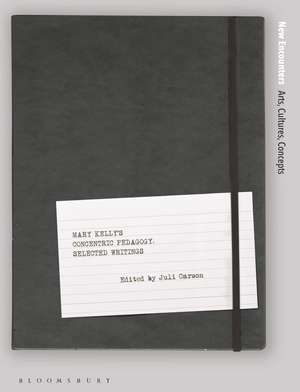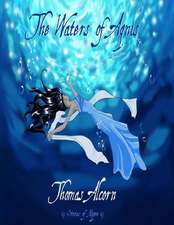Mary Kelly's Concentric Pedagogy: Selected Writings: New Encounters: Arts, Cultures, Concepts
Editat de Juli Carson Autor Mary Kellyen Limba Engleză Paperback – 21 feb 2024
| Toate formatele și edițiile | Preț | Express |
|---|---|---|
| Paperback (1) | 178.01 lei 3-5 săpt. | |
| Bloomsbury Publishing – 21 feb 2024 | 178.01 lei 3-5 săpt. | |
| Hardback (1) | 466.81 lei 3-5 săpt. | |
| Bloomsbury Publishing – 21 feb 2024 | 466.81 lei 3-5 săpt. |
Preț: 178.01 lei
Nou
Puncte Express: 267
Preț estimativ în valută:
34.07€ • 35.43$ • 28.12£
34.07€ • 35.43$ • 28.12£
Carte disponibilă
Livrare economică 25 martie-08 aprilie
Preluare comenzi: 021 569.72.76
Specificații
ISBN-13: 9781350352438
ISBN-10: 1350352438
Pagini: 336
Ilustrații: 100 colour illus
Dimensiuni: 189 x 246 x 25 mm
Greutate: 0.96 kg
Editura: Bloomsbury Publishing
Colecția Bloomsbury Visual Arts
Seria New Encounters: Arts, Cultures, Concepts
Locul publicării:London, United Kingdom
ISBN-10: 1350352438
Pagini: 336
Ilustrații: 100 colour illus
Dimensiuni: 189 x 246 x 25 mm
Greutate: 0.96 kg
Editura: Bloomsbury Publishing
Colecția Bloomsbury Visual Arts
Seria New Encounters: Arts, Cultures, Concepts
Locul publicării:London, United Kingdom
Caracteristici
There is high demand for this book among international teaching institutions, particularly where Kelly has held posts: UCL, Goldsmiths College, Leeds University, Lund University (Malmo), NASCAD, CalArts, Whitney Museum ISP, UCLA, USC, Simon Fraser University (Vancouver), Rhode Island School of Design, Cooper Union, University of the Arts Helsinki
Notă biografică
Mary Kelly is an American conceptual artist, feminist, educator, and writer.Juli Carson is Professor of Art, Criticism and Curation at University of California Irvine, USA. From 2018-19 she was Philippe Jabre Professor of Art History and Curating at the American University of Beirut. Her previous books include Exile of the Imaginary: Politics, Aesthetics, Love (2007), The Limits of Representation: Psychoanalysis and Critical Aesthetics (2011) and The Hermenuetic Impulse: Aesthetics of An Untethered Past (2019).
Cuprins
List of IllustrationsAcknowledgementsSeries Editor Preface, Griselda PollockIntroduction, Juli CarsonPart One: The Method1. Mary Kelly, Concentric Pedagogy: Toward an Ethics of the Observer2. Looking, Listening, Slowing Down, Mary Kelly and Kerry Tribe in Conversation3. Archive (Part One): Attendant Course Schedules / Handwritten Course Notes and Charts4. Mary Kelly, Re-viewing Modernist Criticism5. Formations in the Studio6. Mary Kelly, The Ballad of Kastriot Rexhepi: Notes on Gesture, Medium and MediationPart Two: The Project7. Mary Kelly, Dialogic Procedures and Project-Based Work8. The Dialogic Imagination, Mary Kelly in conversation with Sharon Hayes, Jane Jin Kaisen, Andrea Geyer, Dont Rhine9. Archive (Part Two): Attendant Course Schedules / Handwritten Course Notes and Charts10. Mary Kelly, Miming the Master: Boy Things, Bad Girls, and Femmes Vitales11. Dispersions in the Field12. Mary Kelly, On Fidelity: Art, Politics, Passion and EventPart Three: Project and Method in the Field13. Archive (Part Three): Posters and Symposia Readers14. On the Passage of a Few People Through a Rather Brief Period of Time, Mary Kelly, Moderator, Tate Modern Online Conference15. Mary Kelly's The Practical PastAppendix16. Concentric Pedagogy ChronologyBibliographyAuthor, Editor and Contributors' BiographiesIndex
Recenzii
A significant collection of essays, archival materials, and artist conversations that offers considerable insight into the celebrated teaching methodologies of Mary Kelly. An instruction manual for how to approach, look, think, parse, and speak about art and exhibitions.
Kelly's writings speak to the most urgent concerns in the field today: the systems of art, the solicitation of the art-encounter, and how to attend with rigour to the artwork as a political agent in times of global crisis. This is an important, timely and necessary book.
Mary Kelly is one of our great pedagogues. We have been using her concentric pedagogy since 1997, in the knowledge that it creates the artistic awareness necessary to transform students into artists. Finally, her collected writings on pedagogy is here.
Modelling the interconnections between teaching and artmaking, this book provides an in depth look at how Kelly's "method" and "project" brought feminism and psychoanalysis from first generation conceptualism to the classroom, and includes course materials, projects, and contributions by former students. It will be a valuable resource for artists and educators alike.
Serves as a potent affirmation for artist educators seeking to activate mutually dynamic relationships between an artwork's material particularities and broader worlds of perception, fiction, consumption, exploitation and production.
Finally, Mary Kelly's tremendously influential pedagogy is available beyond the circle of students and colleagues who have been lucky enough to work with her. This book will be an essential resource for everyone who cares about the ethics of engaging with art.
Kelly's writings speak to the most urgent concerns in the field today: the systems of art, the solicitation of the art-encounter, and how to attend with rigour to the artwork as a political agent in times of global crisis. This is an important, timely and necessary book.
Mary Kelly is one of our great pedagogues. We have been using her concentric pedagogy since 1997, in the knowledge that it creates the artistic awareness necessary to transform students into artists. Finally, her collected writings on pedagogy is here.
Modelling the interconnections between teaching and artmaking, this book provides an in depth look at how Kelly's "method" and "project" brought feminism and psychoanalysis from first generation conceptualism to the classroom, and includes course materials, projects, and contributions by former students. It will be a valuable resource for artists and educators alike.
Serves as a potent affirmation for artist educators seeking to activate mutually dynamic relationships between an artwork's material particularities and broader worlds of perception, fiction, consumption, exploitation and production.
Finally, Mary Kelly's tremendously influential pedagogy is available beyond the circle of students and colleagues who have been lucky enough to work with her. This book will be an essential resource for everyone who cares about the ethics of engaging with art.




























